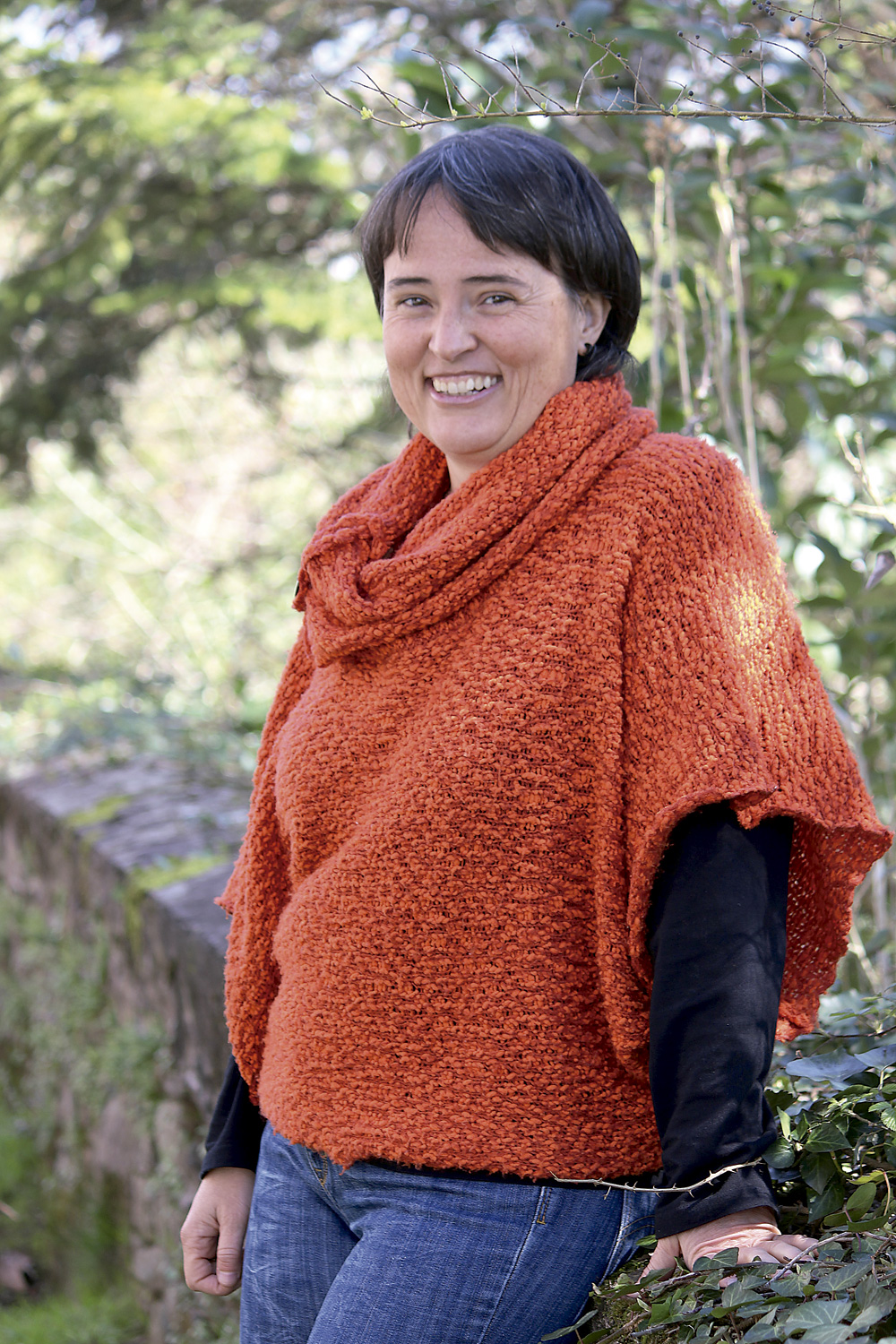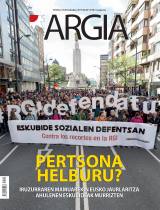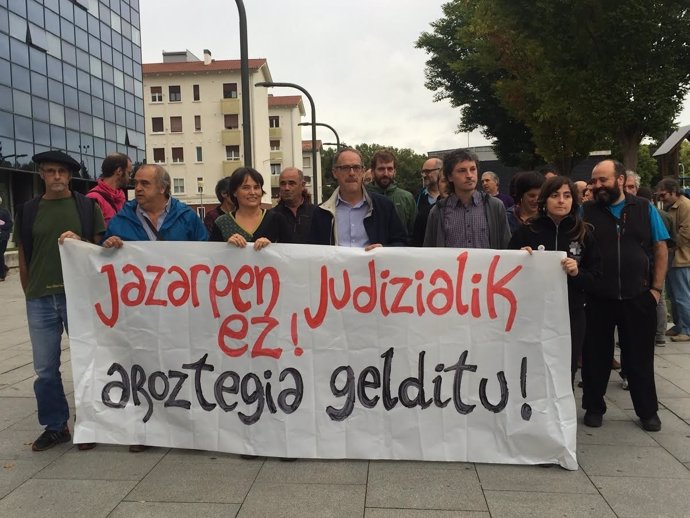"Going to the mayor and not participating in the children's dance was not an option."
- In 2013, he was insulted in the mutil-dantza of Elbet the mayor and the highest representative of the Baztan Valley. Garbiñe Elizegi worked throughout the four years of his term of office: in addition to his usual duties, he had to manage the struggle for egalitarian mutilation and carpentry. These are two wounds, which have not been closed, in the Baztan valley.

Los Angeles ondoko Chinon hazia 9 urte zituen arte. Lekarozen bizi izan zen guraso eta senideekin 18 urte bete bitartean. 1998an Kalifornian zen, 22 urterekin, erizaintza ikasten. Baztanen zen berriz 2002an. 2005ean, Darfurreko kanpamenduetan egin zuen lan sei hilabetez, eta erizain lanean zen Baztanen 2008an. 2011n, Baztango alkate zen. Garai intentsitate handikoak eta atseden sasoiak tartekatuak ageri dira Elizegiren bizian.
We have come to Baztan in a hurry and running. Garbiñe Elizegi heads to America without a return ticket.
I love the valley, I love the Basque Country, but I need to rest from time to time, go here and spend the season in other places. I did so whenever I could.
You were in Darfur on Christmas 2005, in Sudan. War has to be tough.
Yes. I don't know if it was post-traumatic stress, but I was coming here for a year and recovering. I had seen hard things in San Francisco hospital, but in Darfur there was no rest, we were 24 hours in the hospital. On the back, a corner. The reality there, the reality here, on the other hand. I could hardly assume the situation by becoming aware of the responsibility of Europeans and our governments. Like me, many cooperatives are experiencing this concern. I think it's the first experience there's more. It came from war, from seeing my children die, and here, instead, the most important thing was not being able to park my car. Like that.
Did you have a direct war attack?
Only wounded. Some of my colleagues did know about the attacks and also raped some. There was a people taken by the rebels, abandoned by the government, and there was a hospital that we, Médecins sans Frontières, had taken to work with. We were at risk of the government bombing the people and the hospital. On the other hand, there were paramilitaries, Janjaui, who were riding, burning villages – because they were straw houses – and raping women. That was his “battle.” In addition to the hospital work, we went to the places where he had fought, to help the people who had escaped. It was a desert. Dry place. Oxfam, Red Cross, Action Against Hunger -- we were all there.
Does the work carried out by NGOs have any impact?
That debate is always there among us. The work of these organizations is not a solution, but without their help, many living people have already died. There is no aid to many places.
Perhaps the question is wrong. Maybe you should ask him why there are wars here or there.
It is governments that have responsibility, our governments. Wars in the world are controlled by Europe and the United States. I have no doubt. Along with that is what we called the “humanitarian circus.” Among them, a lot of NGOs. Stack. They live from the funding of war-generating governments, without independence… There are many dilemmas every day and it is difficult to maintain coherence. There were still heated conflicts between us.
The sounds of the Erdiz quarry have been silenced. The carpentry is there. As I read, the Baztan City Hall would be willing to accept golf, the hotel and the apartments, if it is to accelerate tourism in the valley. However, it is not willing to allow single-family dwellings to be built in single-family dwellings on the basis of speculation. A land valued at EUR 500,000 would be worth EUR 36 million.
That's the estimate -- I don't know where to start. On the one hand, Baztan is a caramel, the largest municipality in Euskal Herria, where 80% of the lands are communal. On the other hand, natural resources are found in rural areas; the city has eaten everything and, on the other hand, it is there where most people live, unrelated to the people or to nature. Political parties are also in the game of counting votes, and votes are already in the city. We are often sold. The multinationals, those who want to be made with capital, with the land, are always there, but at the same time, the official apparatuses of the parties, the parliament, etc., consider the matters that occur in the peoples of the world to be of the second order. For us it is an Aroztegia to put the Baztan upside down.
What is Baztan’s Aroztegia shrinking?
It revolutionizes the social and urban structure of here. There you have, for example, the shore of Lapurdi. There are other examples in the Spanish State. The defence of a political project is legitimate, but it is not acceptable for a decision to be imposed and taken against the citizens, against the City Hall and the General Boards. The government of “change” in Navarre has acted in Aroztegia like UPN. On the other hand, the parties supporting this government did not find the issue important enough, at least they have not conditioned their activity. The three parties, together, have sufficient strength to channel the matter, as they have done on other matters.
Who are the promoters of Carpinteria?
The property of Caixa Galicia had 50% of the shares. Banks rescued. Baztan’s entrepreneurs, for their part, want to “save” Baztan, create jobs… through tourism. From the city that is always the point of view, that paternalistic discourse of the rural world. On the other hand, there has always been elite in Baztan, and where there is elite there is also resistance. I would say that the resistance is strong in Baztan, we would like to be stronger, but we managed to paralyse the project of the quarry of Erdiz, when the town hall was 100% in favor of the capital. We also managed to paralyze the carpentry, but they tried through the PSIS [Sectoral Plans and Projects with Supramunicipal Incidence], and we are fighting there.

The Carpintería affair has brought you complaints…
I have three court complaints about me. All three of the company Palacio de Aroztegia. The first was presented the day after the elections, when he was mayor, to say that the project was an “urban pelotazo”. According to the second complaint, we are accused of prevarication of the current mayor of Baztan, Joseba Otondo, and both of making decisions against the project when we were mayors. Third complaint Carpentry… and then what? I received him for participating in a press conference where I participated as a member of the platform, along with six other colleagues. They accuse us of insults and ask us for a fine of EUR 50,000 each.
In 2013, you were screamed when you were mayor of Baztan at the children's dance at Elbet's parties.
According to our analysis, numerous changes were taking place in Baztan, some areas in which resistance was being organized, and the valley elites consolidated. Mutil-dantza has been an exhibition of power for many. The elites have been fortified in the villages where there is more money, where the most Castilano-speaking people, the ones that have the most to do with power. It's no coincidence. On the other hand, in the City Hall, what was not expected happened, a very young group, not linked to the elites, was made with the mayor, presided over by the woman and feminist. The one who leaves the herd creates mistrust, and we weren't from the herds. We didn't even go to church.
Judging by the children’s movement, you have been threatened.
Not just me. They told us that they would kick us out if we went to the plaza before we were mayor. In my capacity as mayor, we received insults and threats in several letters that were published in the newspaper a. Despite not being a direct threat, they encouraged violence against us, they said we deserved experience. Being still mayor, I also received in writing death threats, twice, saying that we would be killed if we did not put the Spanish flag. Always stress.
Your persecution is similar to that suffered by women in the paritarian scares of Irun and Hondarribia.
We didn't want to end like them. Baztan's elites tried to make the way here, privatizing the dances of boys, and we saw the need to cut that off at the root, on the other hand, the mutil-dantza that was going to be the way of alarming. More than once I say that we are talking about the issue of boys' dances: here there has been a general plague. We certainly see what attitude to take in the scares of Hondarribia and Irun, but we see something else as far as Baztan's mutil-dances are concerned.
Making the hedgehog is a “general plague,” escaping the problem, hiding.
“Over time, things will be fixed,” we were told by those who supported us in social change. But things don't change with time, but with action. While we were dancing in the plazas, the theme arose because the mutil-dantza was taking place in a public park, in the park of the ikastola. We met to get tired of that abandonment, we talked, but they were still there. We decided to go in. That was our direct action.

They insulted you in that Elbet.
It was very violent, but we did it well. The truth is that I predicted that, silence the music, stop dancing the Mutil-Dantzaris… I had lived this situation in my village, in Lekaroz. But then I wasn't mayor of Baztan. I can't compare it to anything, but they were the ones who had raised me in Lekaroz Square and they received me screaming and threatening me as we walked into the dance. The snowfall made me hard, but even stronger than in my country. On the other hand, there were also internal pressures.
Internal pressures? It means people joining you politically by social transformation.
Yes. The members of the City Hall team joined us, but at the party level not all of them were with us. Excuses for always: “It’s not right… We’ll lose the election…” But going to the mayor and not dancing was not an option. In Amaiur, for example, we went to speak, we started to dance and not silence the Txistulari; we talked, changed the Txistulari and we were able to dance. We told them that if the mayor, in that case I, went to the village, entered the dance and the Txistulari was silent, we could not give subsidies for the discrimination they were committing. There we also had conflicts within Bildu del valle. We were supported by the national structures, we held a seminar, we agreed with our objective, but some did not share our direct action.
Why?
Because the attitude of the feminist movement is always questioned. When we do workshops, with the alarm, etc., it is a factor that appears periodically in the movements of the left: the fear of feminism… In the movements of the left many are afraid of feminism. Because it demands a profound revolution. Many times they sell us a superficial revolution, and feminism is a holistic revolution. The recognition of men’s oppression in left-wing movements, among others, is scary, and that is where we are also doing the trick. The movements on the left also do not deal with internal machismo.
You go to the United States, to Dakota, as your life cycles promise, at intense intervals, at paused intervals.
Yes. I want to get to know New Zealand, Asia and everyone, and I don't know when I'll come back. In the meantime, I'm going to turn around and I'm going to North Dakota to the Indians. They have land in the United States and Canada, in Manitova. I'm going to start for a year. It will look…
“Ez dugu hedabiderik kontrolatzen, hegemonikoak kontra ditugu. Hegemonikoak ez direnek, berriz, guti agertzen dute Nafarroa, eta gutiago mendialde hau. Jo hemerotekara eta ikusi zenbatetan agertu diren Irungo eta Hondarribiko alardeak, eta zenbatetan, aldiz, hemengo mutil-dantzen afera. Periferia gara, bi aldiz periferia”
“Anitzetan estrategia definitzen joaten zaizkigu urteak. ‘Bidegurutzean’ gaudela, ‘une historikoa’ bizi dugula… Nire lagun batek erraten duen bezala, bidegurutzean ez, biribilean sartuta gaude jiraka. Ez gara konturatzen anitzetan kapitalak, patriarkatuak, estatuak… markatzen digutela bidea. Erresistentzia da bidea, derrigorra da gatazka. Ez dago gatazkarik gabeko iraultzarik. Gatazkarik ez dagoen herrietan sumisioa dago”
Baztango mutil-dantzen analisia eta prozesu kolektibo feminista: praktikatik teoriarat eta teoriatik praktikarat artikulua Festak, genero-harremanak eta feminismoa (Miren Guillo, UEU) liburuan jasoa dago. Egileak ondokoak dira: Aitziber Zapiain Intxausti, Edurne Arrieta Alcalde, Elurre Iriarte Bañez, Garbiñe Elizegi Narbarte eta Maitane Maritorena Azkarate, denak Plazara Dantzara herri-ekimenaren kide dira. Ikasleetatik hasi eta agintari politikarietaraino, irakurgai derrigorra, Arantxa Urretabizkaiaren Bidean ikasia nahitaezko irakurgaia den moduan. Parekidetasuna.
Aroztegia proiektuaren kontrako protesta baketsuetan parte hartzeagatik ezarritako zigorrari aurre egiteko diru-bilketa abiaraziko dutela iragarri du herri kolektiboak.
Elkartasunez, hamarnaka herritar elkartu dira Nafarroako Auzitegiaren aitzinean, "herri baten borondatea ezin da epaitu" banderola plazaratuz.
Aroztak Herri Ekimenak jakinarazi du sei pertsona epailearen aurretik igaro beharko direla, Aroztegiako makroproiektuaren aurkako protesten harira. Ekimenak babesa helarazi die, eta mobilizazioak deituko dituela iragarri.
























